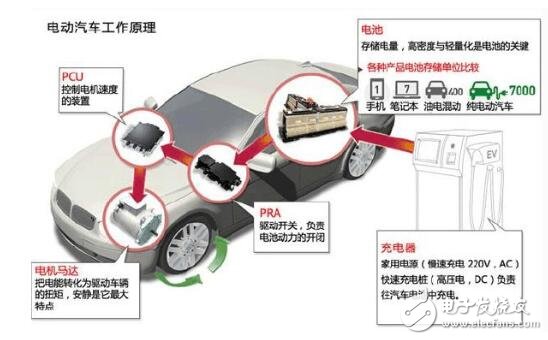Electric vehicle (BEV) refers to a vehicle that is driven by a vehicle power source and driven by a motor to meet the requirements of road traffic and safety regulations. As the impact on the environment is relatively small compared to traditional cars, its prospects are widely optimistic, but the current technology is not mature.
First, the working principle of electric vehiclesBattery - current - power regulator - motor - powertrain - drive the car

From the working principle of electric vehicles, it is not very complicated. But from the beginning of charging, electric vehicles are facing problems. The most convenient way to charge an electric car is of course a household power source. However, the household power supply is 220V AC (AC) charging the electric car very slowly.
The charging pile is very fast to charge but cannot be installed without a dedicated garage. In addition, the charging is relatively fast. At present, the direct current (DC) of the charging pile is about 30 minutes at the earliest. Followed by the battery, in order to increase the cruising range, electric vehicles can only increase the battery capacity. Excessive battery capacity can affect battery life and charging time.
Second, electric cars will become oil price killersCurrently, five countries have announced the end dates for the sale of gasoline and diesel vehicles in the country: Norway (2025), Germany and India (2030), France and the United Kingdom (2040). Moreover, many other countries in the world are preparing to follow suit, which proves that electric vehicles are about to go global and are gradually accepted by the market.
It is reported that the overall purchase cost of electric vehicles (EVs) in Europe is now roughly equal to that of most diesel locomotives. It is expected that with the rapid development of battery technology, the purchase cost of electric vehicles will soon be greatly reduced.
In fact, the disappearance of traditional cars will not be due to environmental problems alone. Moreover, because electric vehicles are easy to operate and have low safety costs.
Cheaper, cleaner, safer electric cars will undoubtedly occupy the automotive consumer market. The only question is how long it will take.
Today, many automakers are realizing the urgency of transitioning to electric vehicles. Volkswagen is leading this shift after experiencing a diesel emissions cheating scandal. The group has announced a strategic plan for electric vehicles called “2025 Planningâ€, which plans to launch 30 electric models in 2025 and bring its annual sales of new energy vehicles to 2 million to 3 million units, accounting for all of its automobile years. 20% to 30% of sales.
Volvo, which is controlled by China Geely Automobile Co., recently announced that all new models launched in 2019 will be all-electric or hybrid. This further indicates that Chinese cars will shift to electric vehicles. At present, China is already the largest electric vehicle market in the world.
In addition, in recent years, renewable energy such as solar energy has also developed rapidly. According to data from Goldman Sachs, by 2030, renewable energy will account for half of the global energy mix. And, in many places, renewable energy such as wind and solar is cheaper than natural gas, oil and coal.
This rapid change will put oil and gas industries into crisis. The Goldman Sachs Group recently stated that global oil demand may peak before 2024. This is different from the traditional analysis results. Traditional analysis shows that global oil demand will peak after 2040.

Many analysts in the oil industry believe that the transformation of market demand will take a long time. ExxonMobil (79.96, -0.20, -0.25%) expects that the current growth in electric vehicles will have a relatively small impact on global oil demand. The company also believes that despite the slowdown in oil demand growth, oil demand will continue to grow until the 1940s.
1. The replacement of traditional vehicles in developing countries is slow
It is worth mentioning that the policy advantages of the new electric vehicles in the UK and France may not determine the fate of the oil industry.
According to the International Energy Agency, although oil demand is expected to fall by nearly 12% between OECD-rich countries between 2015 and 2040, non-OECD countries will grow by 19%. By the end of 2040, 60% of demand will come from outside the OECD.
Mr. Ben van Beurden explained that “the growth of internal combustion engines in developing countries is still relatively strong, because they do not have electrical infrastructure, and electric vehicles will not simply replace traditional cars.â€
BP CEO Bob Dudley said, “Although the rise of electric vehicles is inevitable, traditional cars will last for decades. We predict that by 2035, electric vehicles will reach 1 million. Even if the growth rate of electric vehicles has increased Fan, there are still a lot of traditional vehicles on the road."
2. The decline in gasoline demand may also be offset by the growth in demand from other industries.
The decline in gasoline oil demand is also likely to be offset by the growth of aviation and heavy cargo, and it is more difficult for freight to switch to alternative fuels. Petrochemicals are another source of lasting demand.
According to the International Energy Agency, passenger cars accounted for 26% of global oil demand in 2015, surpassing aviation, shipping and petrochemicals. But then, as passenger cars shift to electric vehicles, the demand for oil will shift to shipping and petrochemicals.
Amin Nasser, chief executive of Saudi Aramco, said last month that even though traditional fuels began to lose market share, history tells us that demand for oil will continue to rise.
Amin Nasser believes that even with the sharp increase in coal in the 20th century, it is difficult to reduce the demand for oil in the global market.
In summary, the current global oil industry is still in the early stages of solving the problem of electric vehicles affecting the oil market. Some companies have begun to plan ahead, and some companies do not agree. Among them, Shell plans to spend up to $1 billion a year to develop alternative energy, but this is still a small part of overall capital expenditure.
"We are a $280 billion company, and we invest between $25 billion and $30 billion a year, so we will build another new shell, which gives us a lot of flexibility to adapt," said a senior Shell official. Changes in global market demand."
Reflecting Liquid Crystal Display

Reflecting Liquid Crystal Display,Electronic Instrument Displays,Electronic Watch Display,Clock Lcd Display
Dongguan Yijia Optoelectronics Co., Ltd. , https://www.everbestlcdlcms.com